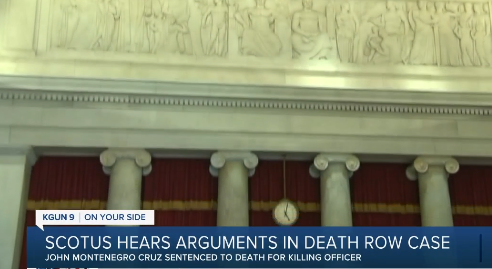Photo: Screenshot
The Supreme Court Wednesday ruled in favor of John Montenegro Cruz, who was sentenced to death in Arizona after his trial judge blocked his lawyers from telling jurors he would not be eligible for parole if they sentenced him to life in prison.
Mr. Cruz argued this violated his constitutional rights under the Supreme Court’s 1994 decision in Simmons v. South Carolina, which held that a defendant has a due process right to inform a capital sentencing jury that they are not eligible for parole if questions are raised about their future dangerousness.
But the Arizona courts rejected Mr. Cruz’s claim, ruling that Simmons did not apply in Arizona because the governor could grant clemency to a person sentenced to life without parole.
That ruling was a mistake. In 2016, the Supreme Court summarily reversed the Arizona Supreme Court in Lynch v. Arizona, holding it was fundamental error to conclude Simmons “did not apply” in Arizona.
After Lynch, Mr. Cruz raised the Simmons claim again. Procedural rules bar defendants from raising the same claim twice, unless there has been “a significant change in the law” that would make a difference in the defendant’s case. Mr. Cruz argued that Lynch did exactly that.
Arizona Supreme Court precedent is clear that a decision overruling precedent constitutes “a significant change in the law,” but the court nonetheless denied Mr. Cruz’s petition and held that Lynch did not qualify as a change in the law.
In Wednesday’s opinion, the Supreme Court held that the state court’s ruling was “an unforeseeable and unsupported” decision that was “entirely new and in conflict with prior Arizona case law.” The Arizona Supreme Court had “abruptly departed from and directly conflicted with its prior interpretations” of what constitutes a “significant change in the law.”
To block review of constitutional claims, a state procedural rule must be “adequate.” The Court held that the Arizona Supreme Court’s ruling did not meet that minimum threshold.
Because the state court’s decision “was so novel and unfounded,” the Court held it was not adequate to bar review of Mr. Cruz’s constitutional claim.
The Court’s decision does not automatically grant Mr. Cruz relief, but it requires the state court to consider his constitutional claim on the merits.
Over the last several decades, states have increasingly erected procedural barriers that shield unconstitutional convictions and sentences from judicial review, even in death penalty cases.
Today’s decision is a singular but significant check on states’ power to block merits review of constitutional claims in death penalty cases.
Equal Justice Initiative: https://eji.org/






